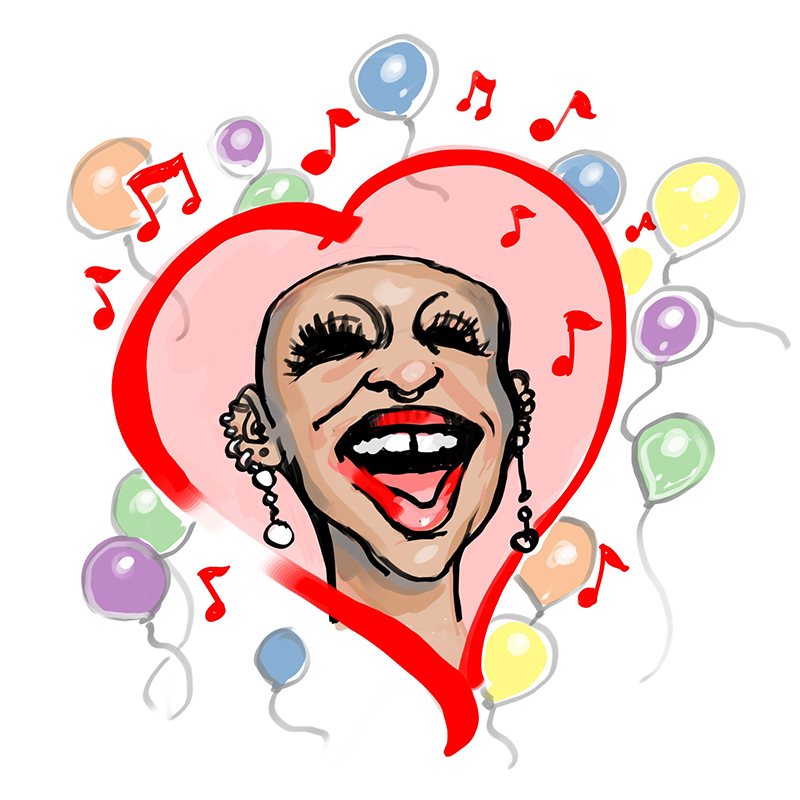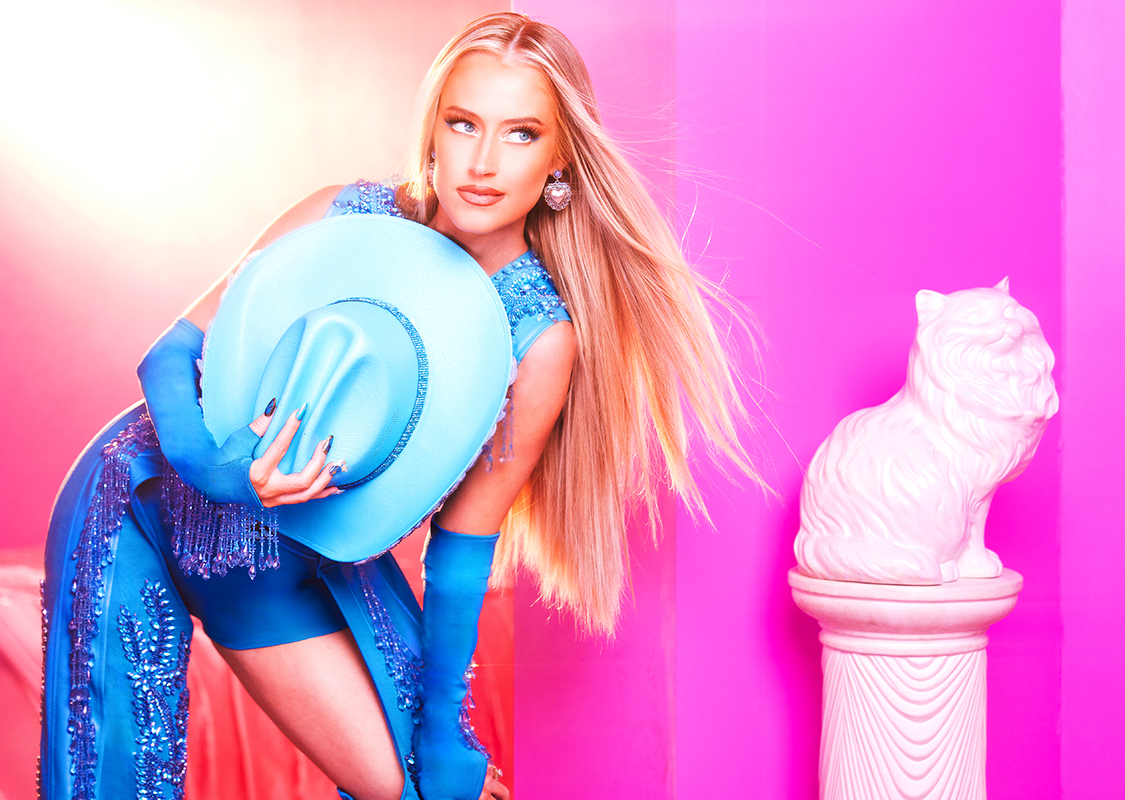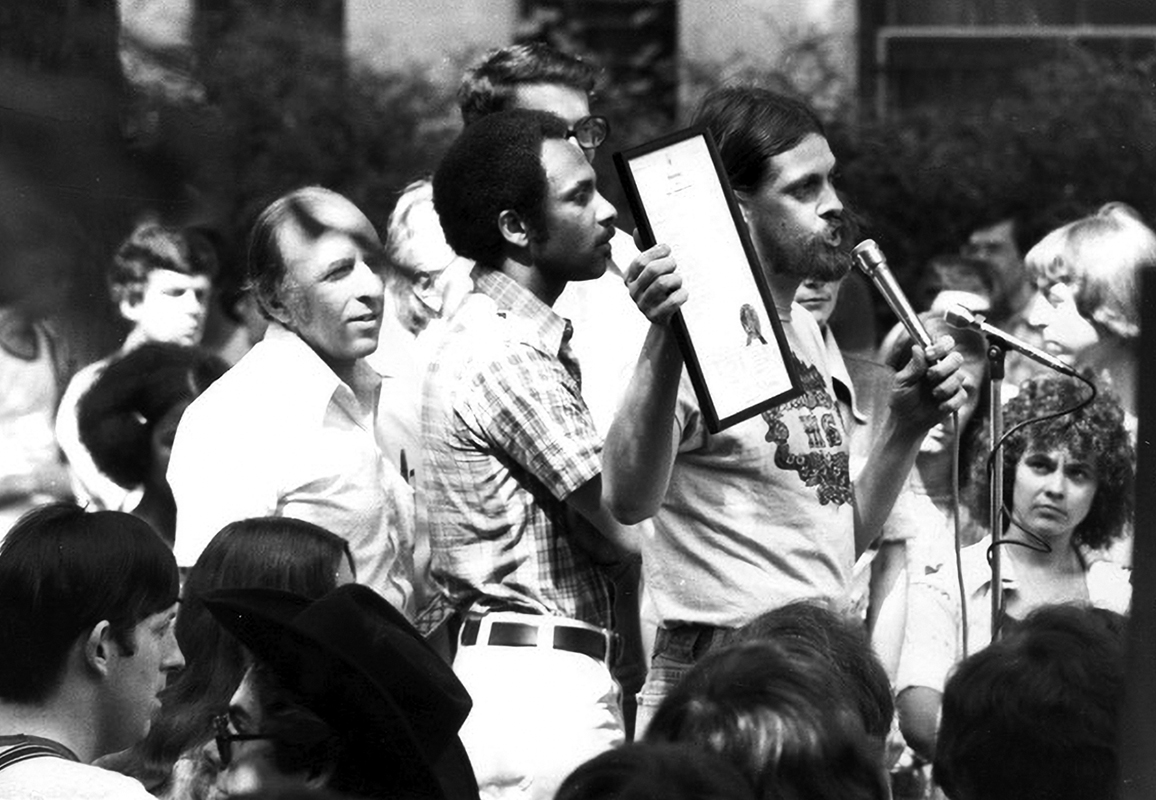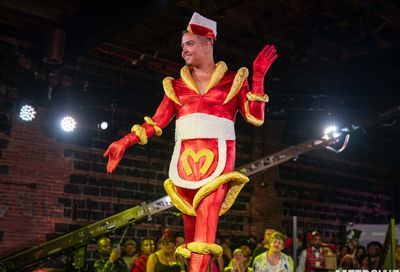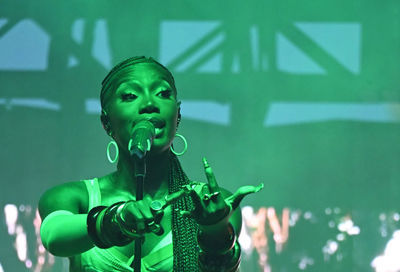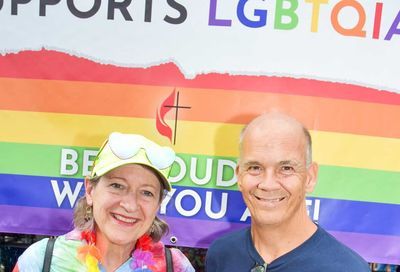Meet the Press
Washington correspondent Kerry Eleveld of The Advocate talks about the face -- and future -- of GLBT journalism
It should come as no surprise that one chapter of Kerry Eleveld’s life contains a stint as an amateur stand-up comic. Her keen wit, sharp voice and knowing smile make her seem like she could have easily dropped in from a classic screwball comedy, one where the wise-cracking gal proves herself a competent player in the newsroom.
Which, of course, she’s done — but without the comedy.
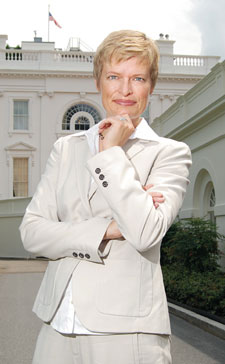
Kerry Eleveld
(Photo by Todd Franson)
After covering the 2008 presidential campaign for The Advocate, during which she scored the rarest of grails for the GLBT press — an actual interview with Barack Obama — she’s now taken up residence in the Washington press corps and become the daily face of GLBT media in the White House press room. Her constant stream of reports for The Advocate‘s Web site are must-reads for those tracking the progress — or lack thereof — on GLBT issues under the Obama administration and Democratic Congress.
It’s a necessary job, as she sees it, even as gay issues more often appear on front pages and newscasts across the country.
”The mainstream media is very primed right now to cover our issues but they don’t really have the resources to do it,” she says. And even when they do, the need for a GLBT-specific approach remains. ”Everyone will throw in a gay question every now and again in an interview, but what mainstream organization would ever do an interview with a politician and ask four or five gay questions in a row? That doesn’t happen.”
Eleveld’s own profile has risen higher in recent weeks with daytime appearances on MSNBC where her journalistic sensibilities are turned to a range of current political events, both GLBT-related and beyond.
”It’s an interesting opportunity. I’d never seen an LGBT outlet’s reporter weighing in on [non-LGBT] issues,” she says, stressing her pleasure at being part of the ”greater American discussion.”
And with Eleveld as part of that discussion, the GLBT community enjoys a distinctive voice, indeed.
METRO WEEKLY: Where are you from, originally?
KERRY ELEVELD: I was thinking about this on the way over. I’m from Michigan, that’s where I grew up and then I went to college at the University of Michigan. After school I moved briefly to L.A. My sensibilities were too Midwestern to sort of take in L.A., so I skipped coasts over to Charleston, S.C. I ended up living in South Carolina for six years. Then I moved to San Francisco and lived there for five years, then New York for about four-and-a-half years. Now here I am in D.C., terrorizing a new city.
MW: I always felt that South Carolina was a place where people were like, ”If you’re not from here, we don’t want much to do with you.” I’m assuming you were working in journalism there.
ELEVELD: Initially, I was working in the food and beverage business. When I came out of undergrad, I didn’t know exactly what I wanted to do but I did have this burning desire to see different parts of the country. The truth of the matter is that there was probably a piece of me that thought I’ve gotta get a good ways away from Grand Rapids in order to explore my sexuality. I found Charleston to be fairly welcoming, in a way. I don’t know if that’s partly because of the industry I was working in or if it’s really just the people. There is a sort of semi-bohemian culture there. It’s a little bit more open-minded than what you would think. They still shun people from ”off,” as they say, but I was able to come out there.
And it’s where I fell into journalism. I started writing for some of the free weekly papers there and eventually sent in an application for an assistant editor of a business journal. I moved up very quickly there — as you can imagine, Charleston was not the business hub of South Carolina. I ended up being hired to go to Greenville, S.C., and start a business journal there as editor-in-chief. Greenville is actually much more the business hub. I did that at 26. For me, that was a lot of responsibility at a young age.
MW: How old are you now?
ELEVELD: Only 33. [Laughs.] No, I just turned 39. I’m still just a tiny baby, although looking down the barrel of 40.
MW: Did you have a career path in mind before you fell into journalism?
ELEVELD: Of course not! I literally had no career path in mind. I was a political-science major in undergrad but I was more intent on seeing different parts of the country. My very first job when I went to L.A. was selling books door-to-door there. A crash course in salesmanship!
MW: What kind of books?
ELEVELD: Bibles. [Laughs.] No, actually, we carried Bibles, but our main products were study guides. They were actually quite good and I did well with them. But the point is, I really didn’t have a career path in mind but I had a knack for writing. A friend wrote to me and said, ”The last letter I got from you was hilarious. You should do stand-up comedy.” So I started doing amateur stand-up for a year. It was quite the experience. I suffered through six months of total silence: No one laughed. Eventually, I developed a persona onstage that was believable and people thought was funny. At the time I had long, blonde hair and I was still dating men. My whole shtick was built around how I had a lot of trouble dating men — I think it was sort of unbelievable because people would see this fairly attractive, articulate woman onstage telling us she has a lot of trouble dating men. I wasn’t believable — it’s like a really skinny person talking about how they hate being fat.
When it occurred to me why I was having so much trouble dating men, I thought, ”Well, I’ll work a bisexual thing into my shtick.” The first time I did I got up onstage in this small backwoods bar and there were only 35 or 40 people. I said the word ”lesbian” and the whole place goes dead silent; you could hear a pin drop. I thought, ”Oh, shit. What have I done?” I kind of got people to laugh at what they were uncomfortable about: ”Of course, no one knows a lesbian in here.” But when I got offstage I said, ”That is it. I can’t do this while I’m in the midst of coming out.” So that was the end of stand-up comedy and the beginning of writing.
MW: You were a poli-sci major in college. Did you have a passion for politics?
ELEVELD: Now I’m a political junkie; then I was just pretending to be. I wasn’t the type of person who was organizing things when I was a small child. You hear of these people who were knocking on doors at the age of 12 and 13, but that wasn’t my course. But I did always have this interest in politics and I think it partly comes from my father. My very first political memory is in Grand Rapids, where Gerald R. Ford is from, and my dad was a huge Ford fan. When Ford lost to Jimmy Carter in 1976, I was 6 years old and thought, ”But my dad was so sure he was going to win. How could the rest of America disagree with him?” I just didn’t get that because I was just 6 years old and I thought my dad was the greatest thing.
Anyway, the attraction to politics had been sort of simmering below the surface this whole time and it grew over the years. Before I knew it, all I really wanted to cover was politics. I started out covering business and you can find a business story in any story, absolutely any story. To some extent, I think you can find a political story in almost any story. If you love something that much, you can always find the angle to fit into the framework from which you write.
MW: In D.C., you’re working with a press corps that’s kind of hyperactive. A lot of people here have been angling for that job since they were 12. How did you feel putting yourself into that particular group of people, into that particular career?
ELEVELD: That’s an interesting question. Let me just back up a second. [When I came to D.C.,] I had been a journalist for almost 15 years, but I’ve only been covering LGBT issues for the past three. So it’s been interesting for me covering LGBT issues but having a background not in activism but in journalism proper. I got my master’s in journalism from UC Berkley.
I have always sort of written or worked for the underdog. Now I’m writing for an underdog constituency, a constituency that doesn’t have its rights. It’s interesting now to be in the White House. I don’t want to step on anyone’s toes or not give someone credit where credit’s due, but I’m pretty sure I’m the only person who has ever been at the White House press briefing room from an LGBT outlet on a regular basis. That’s not to say that there aren’t other gay reporters — there most certainly are. But because I write for an LGBT outlet, that makes it significantly different than just being a gay reporter in the room. In other words, every time [Press Secretary Robert] Gibbs calls on me, he knows I’m going to ask a gay-related question so he’s making a choice [whenever] he calls on me. He avoids me on some days and calls on me on others.
I love it and I think it’s a great opportunity, but I’m pushing boundaries on both sides. There’s a bunch of journalists in the room that, if they’re traditional journalists, have probably always thought of LGBT reporters as being activists and not journalists. Then there’s the White House that doesn’t really want to say too much on LGBT issues because, let’s face it, they’re not moving very fast and they’re trying to buy some time. So I’m in a setting where I’m earning my stripes within the White House press corps but also pushing at the same time a White House that really doesn’t want to be forthcoming on our issues at the moment.
MW: Do you consider yourself an objective journalist or an advocacy journalist? Is it even possible to make that distinction when you’re working for a community that expects a point of view from its news sources?
ELEVELD: I wrestle with that all the time. I would say I walk a fine line because I think that sometimes you can get interviews with high-powered people. The best example, I was lucky enough to get two interviews with Barack Obama during the 2008 campaign. You can get those interviews when people see you as an honest broker, someone who’s going to give someone a very fair trial — it’s easier to get those interviews than if you write from a completely activist standpoint.
Over time, it’s been more difficult because I thought I was going to come to Washington and be racing mainstream journalists to get to LGBT stories, many of which would be about the progress we were making. I couldn’t have been more wrong, right? And that has forced me to be asking questions in a newsroom or in a briefing room where the guy who is answering the questions really doesn’t want to hear the question I’m asking. I cannot escape the fact that I am now an activist just by virtue of the questions that I’m asking and the constituency that I write for.
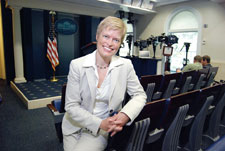
Kerry Eleveld
(Photo by Todd Franson)
MW: I know you’ve pressed Gibbs on ”Don’t Ask, Don’t Tell” repeal, and I’ve also watched as reporters like Air America’s Ana Marie Cox and ABC’s Jake Tapper have pressed that issue and other GLBT issues as well. Does it make it easier to fill your role when there are other journalists who are also willing to ask those questions, more so than they have in the past?
ELEVELD: I think it makes it much easier. I am more pleased to have help. Because here’s the thing: Jake Tapper is the best example. He sits right in the front row. The first two rows [at a press briefing] all get called on. If I’m lucky maybe I can squat in someone else’s seat somewhere fifth or sixth row, otherwise I’m just standing against the wall. But Jake Tapper gets to ask a question every day no matter what, so Gibbs can’t control whether or not he calls on Jake Tapper, he has to. And Jake Tapper, by virtue of that, can ask a gay-related question and not suffer any consequences of not being called on the next day. I don’t want to speak for him, but certainly gay issues are something that I think he finds interesting and he thinks that they are a perfectly legitimate course of inquiry given where our nation is at this moment. It makes it a lot easier and I’m happy for that. When Gibbs calls on Tapper and Tapper asks that question, Gibbs hasn’t had to make a choice that he’s going to answer a gay question, which is what he has to do when he calls on me.
MW: Your reporting has been used both by parts of the GLBT community who say, ”Look, the administration is doing something, they’re answering some questions, they’re moving forward,” as well as people who say, ”They’re just placating us and they’re not moving forward at all.” Do you feel that people are being overly critical too quickly right now, or are we providing the pressure that we should be providing as a community?
ELEVELD: First of all, I think it takes all of us. It takes the people who are a little more conservative in their reactions and the people who are what some would consider a little more reactionary. This is where I’m walking that line of trying to play the straight-up reporter. The way I handle what Gibbs says, which is to simply put it out there, is very different from the way [blogger] Pam Spaulding, whom I love, handles what Gibbs said. Oftentimes, I’m able to just put that on the map and then everybody else can do what they will with it. To me, there’s a utility in just having me provide that information and then it goes where it goes.
Now, I think if we did not have the people who were blasting this administration, we would not have gotten an Oval Office signing ceremony and we would not have gotten a speech in the East Room of the White House. I also believe that the legislation that is now starting to move would not be moving if there hadn’t been a ton of pressure and some big-dollar donors who pulled out of that DNC fundraiser. I think that was absolutely instrumental in making things happen. On the other hand, sometimes once we’re pumped up and ready to go, I think it’s easy for the community to jump on the smallest thing and blow it out of proportion. Having said that, from the community standpoint and not my standpoint as a journalist, if I had to choose between one of those two things, I would rather have more reaction rather than less because during the campaign as well as in the White House, I think these guys have proven that regardless of where their heart really lies, they need a little extra nudge.
MW: Looking at your work, you do some very traditional type of news reporting, even as many journalists have been moving towards less traditional forms, from opinion-based reporting to a heavy reliance on snark. Is it a conscious decision you’ve made in how you approach things?
ELEVELD: I have been very lucky in that The Advocate has given me a lot of room to play around. I pushed to come here. I said, ”Look, we cannot have a Democratic president with all our rights pending and not have someone here in D.C.” Not only did they place me here, but they gave me a lot of room to work this beat as I saw fit. I didn’t know when I got here if I was going to spend five days a week in the White House or five days a week on Capitol Hill. It became clear to me as I talked this through with my editors and as I watched the White House, that I was going to make more of an imprint by being at the press briefings regularly, asking questions and being a general pain in the butt even if I wasn’t getting the questions. Just my presence, me raising my hand and trying to get called on is a thorn in the side to some extent.
I feel like because I’m already writing for a constituency that’s considered a special-interest group I have to walk more of a line and be more traditional — that helps set me apart and maybe gains me a little bit of credibility or legitimacy in the eyes of the politicians I’m trying to gain access to. So The Advocate hasn’t told me to do one thing or another. What I’m focused on is getting information, landing interviews, getting the question in that maybe other LGBT outlets don’t have the chance to.
I have been writing this weekly column where I weigh in with a little bit more of what I think is going on. I find it deeply challenging because I try to give readers more information than what I can convey in a story, and yet I also try to be fairly diplomatic in how I relay that. There are some people on our Web site who just can’t stand the stuff I write because it’s too measured. But my hope is that by being measured, on those instances when I come out and say, ”Wait a second,” it will have more impact. For instance, when Obama went to that fundraiser out in California the day after the state Supreme Court upheld Proposition 8 and he managed not to say anything about it — and also managed to make a snide remark about ”which promises” [when protestors at the event called on him to keep his campaign promises]. I weighed in on that and my hope is that by being measured more often when I actually weigh in with something that’s pretty negative that it will be like, ”If Kerry isn’t giving us the benefit of a doubt on this, then it’s gotta be bad LGBT-wide.”
MW: You’re writing for a publication that has a long history and has undergone a lot of changes. We’ve all been undergoing a lot of changes over the past few years. How do you as a journalist feel about where the gay media is going?
ELEVELD: Look, my profound hope is that my position is no longer necessary in four or five years. Actually, before I got a sense of things in Washington, my profound hope was that it would no longer be necessary in two to three years. I feel passionately about what I do but the truth of the matter is that I have many other interests. I’m really interested in women’s issues, I’m interested in politics, campaigns in general fascinate me. I envision a time when I’m not working for LGBT media partly because the politics of what’s going on with us is no longer as contentious.
I would be lying if I said that I have a long, strong, deep involvement with LGBT media. That’s really not true. I’ll probably put my job in jeopardy now but I really did not read the LGBT media during the first 15 years that I was out. I just didn’t read them. And now here I am working at one. So I don’t have this long history of growing up with and really wrestling and reading and absorbing LGBT media. At times that works for my benefit and at times it’s a detriment. I don’t necessarily think it’s a good or bad thing, it just is. My goal as a journalist in my position here is for me to not be necessary.
MW: Do you feel that the GLBT media are things that need to grow and change, or are they something that will eventually no longer be necessary?
ELEVELD: I started out with business journals, and we were regional publications. To me, the content is different but the aim is not that much different — there is something unique and worthwhile and necessary about doing regional news. And I don’t ever want that to go away for the LGBT community or any alternative publications. You know much better than I how you have to change and grow and adjust to the new landscape as we know it. I don’t have a prescription for that. But I think it’s important. I wouldn’t want it to go away entirely.
I do think that within the LGBT community there’s something different about covering politics, per se, and covering culture — I could see a culture magazine continuing to be relevant for many more years. I personally have no interest in covering culture. I’m terrible at it. I’m completely out of touch most of the time and it’s amazing that I know how to use Twitter. But politics is what turns me on. I think it is so important and we have a lack of people who do it right now for our community. I think there is a dearth of good LGBT political reporters doing it nationwide. For whatever reason I think we have many, many more people who really want a report on the culture of the LGBT community. What I’m happy about is that there are enough people tuned in to what needs to happen politically right now that it makes my position possible and, at least in the short term, sustainable.
MW: To ask a more personal question, do you have a partner?
ELEVELD: I’m single. I was dating a woman in Brooklyn and the nature of my job at the moment is so 24/7 I wasn’t able to balance the two. So, I’m not a good example of a successful, long-term partner sort of person.
MW: Is that focus on work sort of impacting your life here in D.C.?
ELEVELD: My life here is work. It really is. I learned to love New York. When I first got there from San Francisco, it was a tough transition but after about one-and-a-half years, I started to feel and think like a New Yorker. So I really miss New York. I miss the city, I miss the vibe of that city and I miss my New York posse — the people I can just sit and relax with, people I can sit down with and have a beer, play some pool or whatever and completely forget about politics and turn everything off. I don’t have that here and I miss that. When I moved here I didn’t realize how all encompassing it would be and how it would impact my personal life. But I made a promise to myself that I would put my head down for one or two years and do this job as well as I possibly could do it and probably make some personal sacrifices along the way.
MW: You said you need to have some time to drink a beer, play pool….
ELEVELD: That’s the lesbian in me. What a good dyke I am! Will you point that out? [Laughs.]
MW: Do you draw your friends from your professional arena or do you tend to draw your friends from way outside of that arena?
ELEVELD: Usually I draw them from my professional arena because those are the circles I run in. I like to have a number of folks who are tuned in politically and that I can banter back and forth with. I had a friend come down this past weekend and he was staying in a hotel that had a pool — we treated it like we were in Miami and put our bathing suits on for the day and had a couple of drinks by the pool and I really was on vacation for a day in D.C. I hardly even knew I was here. It’s so good for me to turn my brain off every once in a while — it happens so rarely.
Support Metro Weekly’s Journalism
These are challenging times for news organizations. And yet it’s crucial we stay active and provide vital resources and information to both our local readers and the world. So won’t you please take a moment and consider supporting Metro Weekly with a membership? For as little as $5 a month, you can help ensure Metro Weekly magazine and MetroWeekly.com remain free, viable resources as we provide the best, most diverse, culturally-resonant LGBTQ coverage in both the D.C. region and around the world. Memberships come with exclusive perks and discounts, your own personal digital delivery of each week’s magazine (and an archive), access to our Member's Lounge when it launches this fall, and exclusive members-only items like Metro Weekly Membership Mugs and Tote Bags! Check out all our membership levels here and please join us today!








